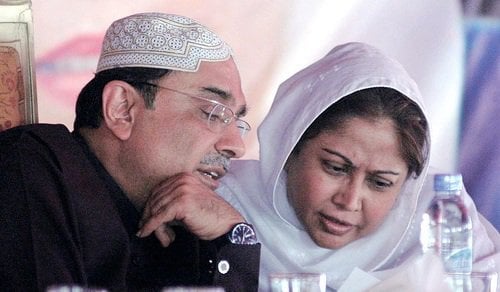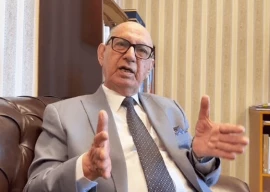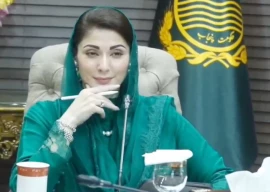
While hearing a suo motu case with regard to alleged transfer of Rs42 billion through fake accounts, an SC bench, headed by former CJP Mian Saqib Nisar, on January 7 ordered the National Accountability Bureau (NAB) to conduct a fresh investigation against the persons against whom a joint investigation team (JIT) had recommended further inquiry.
The bench had asked NAB to complete its investigation within two months and file references against the suspects – including the PPP Co-chairman Asif Ali Zardari, his sister Faryal Talpur and Omni Group owners – if the offence is made out.
Later, the PPP leaders and Omni Group owners filed review petitions against the verdict, while also calling into question the apex court’s jurisdiction to take suo motu notice on this issue.
Decision to remove Bilawal, Murad’s names from ECL to be made after SC judgement: Qureshi
It was first time the Chief Justice of Pakistan (CJP) Justice Asif Saeed Khosa heard a high profile corruption case, whose hearing continued for four hours. And the CJP in his remarks justified suo motu jurisdiction under Article 184 (3) of the Constitution.
“When there is ‘institutional capture’ then we are not helpless,” he said while justifying the suo motu jurisdiction in this matter. The CJP made it clear that the Supreme Court never restricted NAB to investigate the matter in Islamabad only.
During the hearing, the CJP asked counsels for petitioners why should the court not ask relevant agency to probe into the matter when billions of rupees have been transferred.
Giving justification for formation of the JIT, the CJP said under Article 190, all executive and judicial authorities throughout Pakistan shall act in aid of the Supreme Court.
He wondered why the review petitions had been filed as there is no determination in this case. He also said on a lighter vein that the review should have been filed by ‘falooda’ sellers, in whose accounts billions of rupees were deposited.
“When you disown accounts then what’s problem in the investigation as you may be exonerated by the NAB. Let them (NAB) prove first that it’s your money,” he said.
The CJP also remarked that 99.9 per cent arguments are based on apprehension. “We cannot adjudicate on apprehension,” he added.
Regarding transfer of investigation from Karachi to Islamabad/ Rawalpindi, the CJP said it is up to NAB to investigate the case wherever it wishes to.
“Under the law, NAB chairman has the authority to transfer cases. However the accused can challenge such order at an appropriate forum,” he said.
He made it clear that all accused persons can apply for bail at relevant forums. Another member of bench, Justice Ijazul Ahsan, who authored January 7 verdict, asked counsels for the petitioners to point out errors in the judgement.
Justice Ahsan also noted the counsels for petitioners admitted that the Supreme Court has ample power under Article 184 (3) of the Constitution to investigate the matter.
Earlier, Latif Khosa counsel for Zardari raised several objections to the judgement and urged the SC to set parameters of suo motu jurisdiction. He also referred the incumbent CJP’s speech about limiting exercise of suo motu jurisdiction.
When he pointed out difference in the order dictated by former CJP Saqib Nisar and the final order in fake accounts case, Justice Ahsan noted that the order was misreported on January 7 as the court excluded names of Bilawal Bhutto Zardari and Murad Ali Shah from the JIT report.
The counsel also questioned inclusion of officials from the Inter-Services Intelligence (ISI) and the Intelligence Bureau (IB) in the JIT. Khosa said the ISI should not be involved in civilian affairs, adding that the court can not involve the ISI in such affairs contrary to the law.
However, Justice Ahsan insisted that the SC can direct all executive authorities to assist in any matter. Munir Bhatti, counsel for the Omni Group, alleged that the FIA is harassing his clients in the garb of the court order, adding that two parallel investigations are going on.
The bench later ruled that all the review petitions are dismissed.
Experts view
NAB forms team to probe fake accounts case
The JIT attorney Faisal Siddiqi while talking to The Express Tribune said: Today’s (Tuesday) proceedings clearly proved one thing that after God, the only thing which is truly 'Omni' is the rule of law and the Supreme Court.”
He while appreciating the CJP Khosa said the bench No 1, headed by the CJP, patiently heard the counsels, displaying the highest standards of due process and then calmly dismissed the reviews, displaying justice according to law. Interestingly, the petitioners did not specifically object to the court’s direction about submission of periodic reports before the SC.
One section of lawyers believes that the SC should not supervise the trial and investigation in this matter as it has been witnessed that the court’s monitoring in Panamagate case has not been a good experience for the apex court.
After the Pakistan Muslim League-Nawaz (PML-N) leadership, the apex court has now given ruling against the PPP leadership in a graft case. Legal experts believe that both SC's judgements will give big political benefit to the ruling Pakistan Tehreek-e-Insaf (PTI).
Fake accounts case: Omni Group rejects JIT allegations
The fake accounts saga
In December 2015, the Federal Investigation Agency began a discreet investigation into certain bank accounts through which multi-billion rupee transactions have been made. According to FIA sources, information regarding the fake accounts came to the fore when an intelligence agency picked up a prominent money changer in an unrelated case.
As the monitoring and investigation of these suspicious accounts continued, it surfaced that five of these accounts in two banks – the Sindh Bank and Summit Bank – had been used for transactions worth around Rs15 billion.
Investigation showed the accounts were operated by fake companies. Funds were credited into these accounts from contractors with multi-billion rupee contracts with the Sindh government. The money was found to have been transferred to accounts of companies owned and operated by the Omni Group, whose chairperson, Anwar Majeed, is a close aide of Pakistan Peoples Party (PPP) co-chairperson Asif Ali Zardari. Another beneficiary was Nasir Lootah, the chairperson of Summit Bank.
The probe, however, was shelved. It resumed almost a year and a half later. FIA’s State Bank circle initiated a formal inquiry in January, 2018.
By June, the FIA had several high-profile names on its list but was unable to make headway – for several reasons. It was at his point that the Supreme Court intervened. Chief Justice Mian Saqib Nisar took suo motu notice of the ‘slow progress’ in the money laundering case.
In July, Zardari’s close aides; Hussain Lawai, Taha Raza and two others were arrested. Subsequently, the first case was registered in the mega-corruption scandal.
The FIA submitted its report to the apex court on July 8 which revealed a web of companies and accounts that were being used to transfer billions of rupees.
In all, 29 accounts were identified that received payments, totaling at least Rs35 billion.
In August, Omni Group chief Anwar Majeed was arrested along with son Abdul Ghani Majeed when they returned to the country on being summoned by the apex court. They are now on judicial remand.
Meanwhile, Asif Ali Zardari and Faryal Talpur have appeared before the investigators and have since secured interim bail from the Banking Court. The last hearing of the case was on December 21, when the duo got their fourth extension in the bail till January 7.
Amid complaints from the FIA and barbs flying in the Supreme Court, CJP Nisar ordered the formation of a Joint Investigation Team to quicken the pace of the investigation. One of FIA’s principal complaints was the lack of cooperation from the Sindh government.
Top court orders Bilawal, Shah’s names off ECL
The JIT report in a nutshell
According to the report, the JIT identified 11,500 bank accounts and 924 account holders at the start of their investigation.
Its experts generated 59 Suspected Transaction Reports (STR) and 24,500 Cash Transaction Reports. That means the transactions were flagged as suspicious.
Due to the high quantum of transactions, the JIT decided on a threshold of Rs10million “to track, follow and minutely investigate the flow of funds beyond the immediate counterparties and determine the source of funds and ultimate beneficiaries.”
It questioned 767 individuals, including Zardari and Talpur, while Bilawal submitted written responses.
It has since had the names of 147 individuals placed on the Provisional National Identification List, which would allow authorities to identify if those individuals try to enter or exit the country through an airport. After the report was submitted to the SC, the names of 172 individuals have been placed on the no-fly list by the interior ministry on the JIT’s request.
The investigations have focused on 32 accounts of 11 fake entities. The first account, belonging to M/S Lucky Enterprises, opened in January 2010 and remained active till January 2017. It was used for 13,809 transactions.
Damning JIT report indicts Zardari, Omni groups
The investigation uncovered that the 11 sole proprietorship entities were registered in the names of low-level employees of the Omni Group, as well as random individuals including a deceased person. All the accounts were operated by Omni Group executives.
A thorough review of the JIT report shows that representatives of State Bank and Securities and Exchange Commission of Pakistan (SECP) played a vital role in the investigation and preparation of the final report and recommendations.
Read the full text of the JIT report here.



1731916090-0/sabrina-(3)1731916090-0-165x106.webp)













COMMENTS
Comments are moderated and generally will be posted if they are on-topic and not abusive.
For more information, please see our Comments FAQ